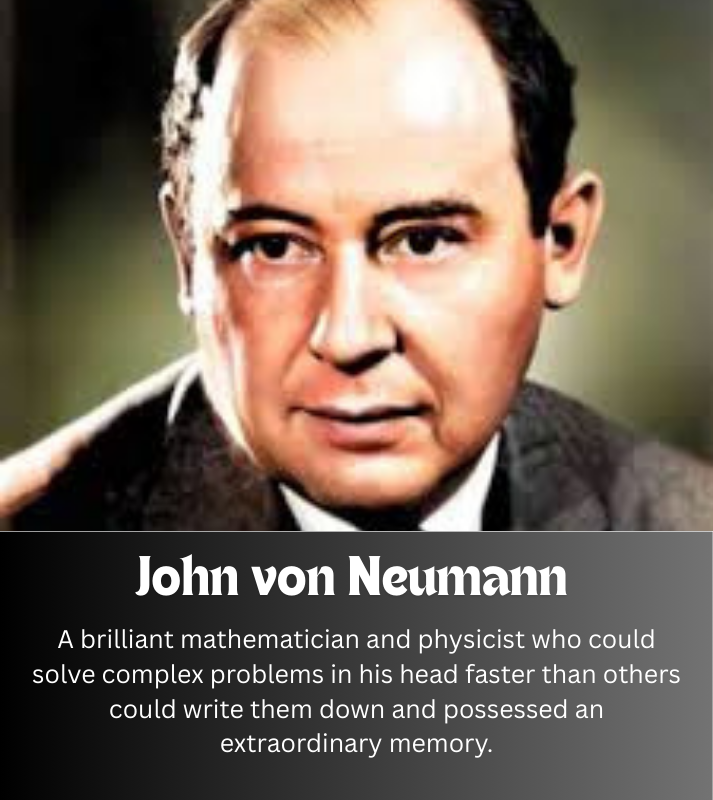John von Neumann
The Fastest Mind of the 20th Century


John von Neumann (1903-1957) was a Hungarian-American mathematician, physicist, and polymath whose intellect was so profound that it left his contemporaries in awe. He was a "1 in a million" thinker with a mind that operated at a speed and capacity that seemed almost superhuman. He could solve complex mathematical problems in his head faster than others could write them down, and he possessed an extraordinary memory that allowed him to recall information with perfect, verbatim accuracy.
The Human Computer 💻
Von Neumann's mental abilities were legendary. He was a child prodigy who could divide two eight-digit numbers in his head at the age of six. As an adult, his computational speed and memory were the subject of many famous anecdotes. For example, when presented with the classic "fly puzzle" (involving two bicyclists and a fly), he immediately gave the correct answer without writing anything down. When the questioner asked if he had heard the "trick" before, von Neumann famously replied, "What trick? I just summed the infinite series."
His memory was equally astonishing. Colleagues at the Institute for Advanced Study in Princeton noted that he could read a book or scientific paper and, years later, quote it back verbatim. This photographic memory allowed him to master vast and diverse fields of knowledge, from mathematics and physics to history and economics. He had a seemingly effortless ability to connect disparate ideas and see patterns that others couldn't.
John von Neumann: The Fastest Mind of the 20th Century
A Giant in Multiple Fields 🌌
Von Neumann's genius was not confined to a single discipline; he made groundbreaking contributions to an incredible array of fields, fundamentally reshaping modern science and technology.
Computer Science: He is considered one of the founding fathers of modern computing. The von Neumann architecture, which describes the design of a computer with a stored-program concept (where both the program and the data are stored in the same memory), is the basis for virtually every modern computer, from your smartphone to supercomputers.
Quantum Physics: Von Neumann provided the first mathematically rigorous framework for quantum mechanics in his 1932 book, Mathematical Foundations of Quantum Mechanics. He introduced the concepts of Hilbert spaces and operators, which are still the fundamental tools for studying quantum theory today.
Game Theory: He is the principal founder of game theory, a mathematical study of strategic decision-making. His 1928 proof of the minimax theorem was a revolutionary development. His work with economist Oskar Morgenstern culminated in the 1944 book, Theory of Games and Economic Behavior, which has had a profound and lasting impact on economics, political science, and evolutionary biology.
The Manhattan Project: During World War II, von Neumann was a key consultant on the Manhattan Project. He was an expert in the physics of explosions and shock waves, and his calculations were crucial to the design of the explosive lenses used in the implosion-type atomic bomb, which was dropped on Nagasaki. He was also involved in the calculations for the hydrogen bomb.
A Legacy of Speed and Vision 🌠
John von Neumann's colleagues, including some of the greatest minds of the 20th century, often described his intellect as being on a different plane. Nobel laureate Hans Bethe once said, "I have sometimes wondered whether a brain like von Neumann's does not indicate a species
superior to that of man."
His life was a testament to the power of a mind that could not only think faster and remember more but also synthesize knowledge across fields to create entirely new ones. He was a force of nature, a brilliant innovator, and a true "1 in a million" who left an indelible mark on the scientific world.
Discover the extraordinary and unique stories.
Inspire
© 2025. All rights reserved.
